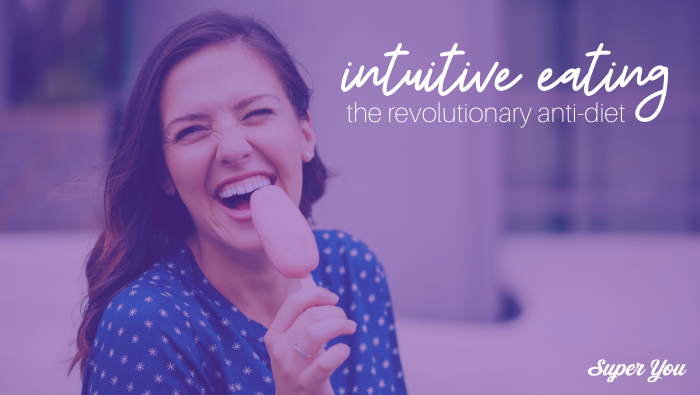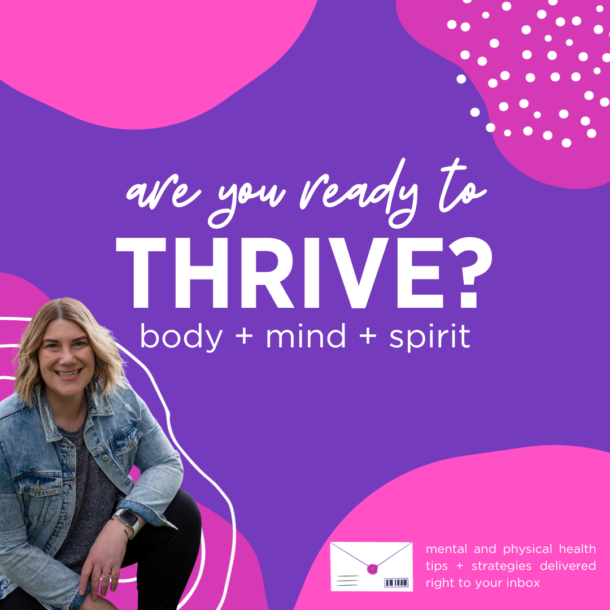Pretty much everywhere you turn there is information about a weight loss plan or program promising to help you “banish the bulge” – for good! But sadly, while many of these plans and programs might work, the results are essentially temporary.
According to research out of UCLA while it is possible to lose 5-10% of your body mass with a diet, the majority of people regain all the weight, plus more. Sustained weight loss is found only in a small minority of participants, while complete weight regain is found in the majority.
The bottom line? Diets do not lead to sustained weight loss or health benefits for the majority of people.
Thankfully there’s another way – that is backed by the research!
More than 10 peer reviewed studies have shown that people who adhere to an intuitive eating approach have higher self-esteem and a lower BMI (oh the irony). Importantly they achieve this while not idealizing the thin ideal. Further studies have shown the additional health benefits of higher HDL (good cholesterol) and lower triglycerides.
What I like most about this approach is that the focus is taking off the physical aesthetic completely. In fact, part of the first principle involves ditching the scale completely and taking the focus off weight loss entirely. Which is music to my Health at Every Size ears!
So what is this revolutionary approach? Before I dig into it…a little backstory.
The Backstory
I first learned about Intuitive Eating after reading an article back in 2006. American Idol contestant Katherine McPhee talked about how helpful the philosophy was in her recovery from Bulimia. I was intrigued, so I picked up a copy of the book Intuitive Eating: A Revolutionary Program that Works by Evelyn Tribole and Elyse Resch.
At the time I wasn’t ready for some of the ideas. Break up with my scale? Reject diet mentality? Put weight loss on the back burner? These ideas seemed ludicrous.
In 2006 I was still deeply entrenched in diet culture and while I wasn’t actively engaging in my eating disorder (I was bulimic from the age of 15-19), I was still on various different diets, cleanses and plans. I was always looking for the “next thing” that might solve this “problem” (in my eyes: my body not meeting cultural norms for a fitness professional). So while I wouldn’t have said I was in the active stages of an eating disorder, looking back I can absolutely recognize that my eating was disordered. My view of food was very black and white (good/ bad). My happiness was absolutely dictated by the number on the scale (down? happy dance; up? the horror!). And I was struggling – big time. A large percentage of my mental real estate was wrapped up in food, eating and fitness. I thrived on compliments and comments about my weight loss and athletic achievements. And constantly worried about how my body looked, whether I was “looking the part” and if I was fit enough.
A Changing Perspective
Being pregnant was the beginning of my shift. There’s something truly magical about carrying a baby. All of the sudden you realize just how profoundly amazing your body is – you are literally making a human (how cool is that?!). It was the first time I actively wanted my photo taken and was proud of this beautiful belly. My awe in my body continued through my pregnancy, and then came to a screeching halt after delivery. What the what?! Why do I still look pregnant? And why isn’t this “baby weight” melting off?
Bring on the diets, plans and programs.
And they worked! But even once I reclaimed my “pre-baby body” I still felt uncomfortable in my skin.
Then came a second pregnancy and I was a little less awestruck and a lot more sick. But once again, delivered another beautiful babe and was grateful. But not for my post-baby body.
The second time around it was even harder to love my body. I once again leaned on diets. But it didn’t work this time.
So I started wondering – what if it’s not me?
I began to work on accepting my now body. It didn’t happen overnight. It was a process. I didn’t knowingly start integrating the ideas, but rather the philosophy found me as I journeyed through my second post-natal period and started to come “home” to my body.
I recently re-read the book and whether I internalized these ideas back in 2006 or I found them through my own process I’ll never know, but the philosophy is one that resonates and I truly believe based on the compelling research and my own experience with this philosophy, that it’s absolutely revolutionary. And I truly believe it has the capacity to reverse the health crisis we’re facing as a society. A health crisis that in my opinion is a direct result of our diet crazed and aesthetics obsessed culture.
What is Intuitive Eating?
Intuitive Eating is a philosophy based on 10 guiding principles. Through a process of personal inquiry and curiousity individuals embrace the 10 Principles, and as a result experience more freedom around food and rediscover the pleasures of eating (and moving)!
What are the 10 Principles*?
1. Reject the Diet Mentality
Throw out the diet books and magazine articles that offer you the false hope of losing weight quickly, easily, and permanently. Get angry at diet culture that promotes weight loss and the lies that have led you to feel as if you were a failure every time a new diet stopped working and you gained back all of the weight. If you allow even one small hope to linger that a new and better diet or food plan might be lurking around the corner, it will prevent you from being free to rediscover Intuitive Eating.
2. Honour Your Hunger
Keep your body biologically fed with adequate energy and carbohydrates. Otherwise you can trigger a primal drive to overeat. Once you reach the moment of excessive hunger, all intentions of moderate, conscious eating are fleeting and irrelevant. Learning to honour this first biological signal sets the stage for rebuilding trust in yourself and in food.
3. Make Peace with Food
Call a truce; stop the food fight! Give yourself unconditional permission to eat. If you tell yourself that you can’t or shouldn’t have a particular food, it can lead to intense feelings of deprivation that build into uncontrollable cravings and, often, bingeing. When you finally “give in” to your forbidden foods, eating will be experienced with such intensity it usually results in Last Supper overeating and overwhelming guilt.
4. Challenge the Food Police
Scream a loud no to thoughts in your head that declare you’re “good” for eating minimal calories or “bad” because you ate a piece of chocolate cake. The food police monitor the unreasonable rules that diet culture has created. The police station is housed deep in your psyche, and its loudspeaker shouts negative barbs, hopeless phrases, and guilt-provoking indictments. Chasing the food police away is a critical step in returning to Intuitive Eating.
5. Discover the Satisfaction Factor
The Japanese have the wisdom to keep pleasure as one of their goals of healthy living. In our compulsion to comply with diet culture, we often overlook one of the most basic gifts of existence—the pleasure and satisfaction that can be found in the eating experience. When you eat what you really want, in an environment that is inviting, the pleasure you derive will be a powerful force in helping you feel satisfied and content. By providing this experience for yourself, you will find that it takes just the right amount of food for you to decide you’ve had “enough.”
6. Feel Your Fullness
In order to honour your fullness, you need to trust that you will give yourself the foods that you desire. Listen for the body signals that tell you that you are no longer hungry. Observe the signs that show that you’re comfortably full. Pause in the middle of eating and ask yourself how the food tastes, and what your current hunger level is.
7. Cope with Your Emotions with Kindness
First, recognize that food restriction, both physically and mentally, can, in and of itself, trigger loss of control, which can feel like emotional eating. Find kind ways to comfort, nurture, distract, and resolve your issues. Anxiety, loneliness, boredom, and anger are emotions we all experience throughout life. Each has its own trigger, and each has its own appeasement. Food won’t fix any of these feelings. It may comfort for the short term, distract from the pain, or even numb you. But food won’t solve the problem. If anything, eating for an emotional hunger may only make you feel worse in the long run. You’ll ultimately have to deal with the source of the emotion.
8. Respect Your Body
Accept your genetic blueprint. Just as a person with a shoe size of eight would not expect to realistically squeeze into a size six, it is equally futile (and uncomfortable) to have a similar expectation about body size. But mostly, respect your body so you can feel better about who you are. It’s hard to reject the diet mentality if you are unrealistic and overly critical of your body size or shape. All bodies deserve dignity.
9. Movement—Feel the Difference
Forget militant exercise. Just get active and feel the difference. Shift your focus to how it feels to move your body, rather than the calorie-burning effect of exercise. If you focus on how you feel from working out, such as energized, it can make the difference between rolling out of bed for a brisk morning walk or hitting the snooze alarm.
10. Honour Your Health—Gentle Nutrition
Make food choices that honour your health and taste buds while making you feel good. Remember that you don’t have to eat perfectly to be healthy. You will not suddenly get a nutrient deficiency or become unhealthy, from one snack, one meal, or one day of eating. It’s what you eat consistently over time that matters. Progress, not perfection, is what counts.
*reference: intuitiveeating.org
Where to start
If you’re curious about this approach to nutrition there are many ways you could explore! You can go the self-study route using the Intuitive Eating Book (currently in its 4th Edition) and/or the Intuitive Eating Workbook (links on this page). You can also work with a Certified Intuitive Eating Counsellor such as myself. I often work with clients using a hybrid approach where they use the workbook and have the support of me as a coach to guide them and help them deepen their inquiry and practice of this approach. I also have a virtual course to guide you.
However you decide to go if you feel called to explore it, I encourage you to go for it!
Daily I hear from clients just how transformative this framework has been for their health and happiness. You deserve to feel free and relaxed around food and fitness! If you’d like to connect for a free discovery call to explore what the right first steps might be for you click here.

